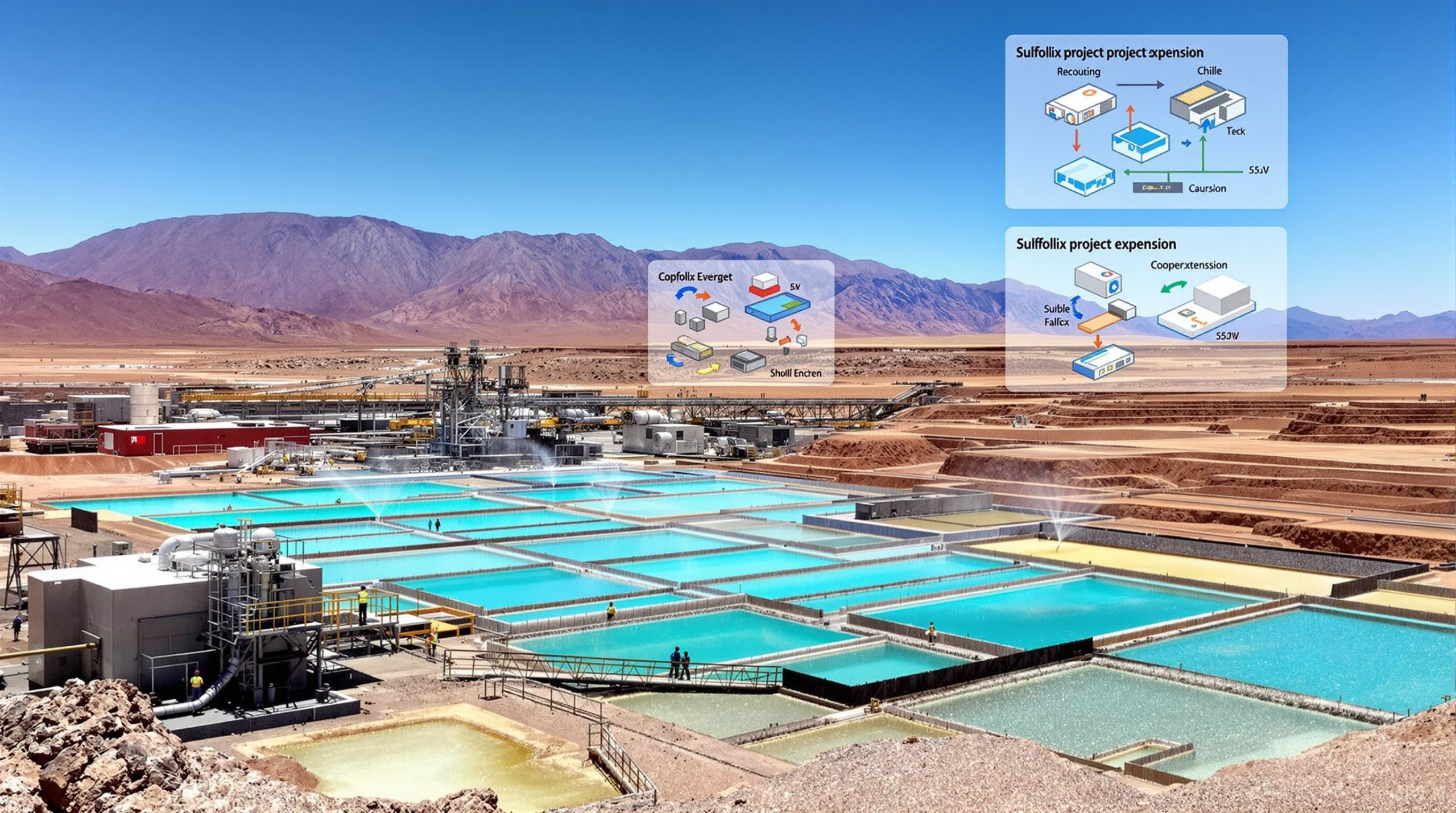Why is the US Re-evaluating the $2.3bn Thacker Pass Lithium Loan?
The US government is conducting a comprehensive reassessment of the $2.3 billion loan package for the Thacker Pass lithium project in Nevada, raising serious questions about the future of what could become America's largest lithium production facility. This review represents a significant shift in federal support for domestic critical mineral development and highlights evolving concerns about economic viability amid fluctuating global lithium market challenges.
The financing, initially finalized in 2024 to fund construction of a processing facility next to one of the country's largest lithium deposits, is now under intense scrutiny as the Department of Energy (DoE) weighs concerns about competition from lower-cost Chinese producers and questions the project's ability to secure binding customer commitments.
Understanding the Strategic Reversal on America's Largest Lithium Project
The loan reassessment forms part of a wider review of the Department of Energy's $400 billion green financing program, suggesting a potential shift in federal priorities regarding clean energy investments and critical mineral development. Greg Beard, a senior advisor in the Loan Programs Office, has warned about the venture's struggle to secure customers, highlighting concerns about the project's commercial viability despite its strategic importance.
This reversal comes at a critical time for US critical minerals strategy, as the government simultaneously explores alternative approaches to securing battery materials, including negotiations with Orion Resource Partners to establish a multibillion-dollar fund for overseas mining projects.
What is the Thacker Pass Lithium Project?
The Strategic Importance of America's Largest Lithium Deposit
Thacker Pass represents one of the largest lithium resources in the United States, with potential to substantially bolster domestic supply chains for electric vehicle batteries and energy storage systems. Located in northern Nevada, the project has been positioned as a critical component in reducing US dependence on foreign lithium supplies, particularly from China, which currently dominates global processing capacity.
The strategic value of this project extends beyond simple resource extraction—it represents a cornerstone of America's broader ambitions to develop resilient domestic battery supply chains, reduce reliance on imports from geopolitical competitors, and support the growing electric vehicle industry.
Development Timeline and Current Status
The Thacker Pass project has been years in the making, with significant recent developments including:
- December 2024: General Motors acquired a 38% stake for $625 million in cash and letters of credit
- 2024: Department of Energy finalized the $2.3 billion loan package to fund construction of the processing facility
- September 2025: Loan reassessment announced amid changing market conditions
General Motors' substantial investment underscores the project's importance to the domestic automotive industry, with the company committing approximately $1 billion to its development, including a nearly $200 million letter of credit.
Why is the Government Reconsidering the Loan?
Economic Viability Concerns in a Competitive Market
The Department of Energy's loan reassessment stems from several interconnected factors that have raised questions about the project's commercial viability:
Market Competition from Chinese Producers
The review appears largely motivated by concerns about competition from lower-cost Chinese lithium producers. Chinese companies have established dominant positions in global lithium processing, often operating at lower costs due to economies of scale, established supply chains, and sometimes less stringent environmental regulations.
This cost advantage poses a significant challenge to emerging North American production, potentially undercutting the economic case for developing higher-cost domestic resources despite their strategic importance.
Lack of Binding Offtake Agreements
A key issue identified by Greg Beard, senior advisor in the Loan Programs Office, is the project's apparent difficulty in securing firm customer commitments. The Department of Energy is reportedly pressing General Motors to enter into binding offtake agreements to ensure a stable revenue stream for the project.
Without such agreements, there's uncertainty about whether Thacker Pass can secure the long-term sales contracts needed to justify the substantial federal investment, regardless of the project's strategic importance.
Broader Review of Green Financing
The reassessment forms part of a wider review of the Department of Energy's $400 billion green financing program, suggesting this isn't an isolated case but potentially part of a broader recalibration of federal support for clean energy and critical mineral projects.
This comprehensive review may signal a shift toward more stringent commercial viability requirements for projects seeking federal backing, even those aligned with strategic national interests.
What Are the Stakeholder Positions?
Key Players in the Thacker Pass Development
The loan review has prompted responses from various stakeholders, each with their own perspectives on the project's future:
General Motors' Perspective
GM has publicly expressed continued confidence in the project, noting that it has committed approximately $1 billion to its development, including a $200 million letter of credit. A GM spokesperson emphasized that the project "supports the administration's goals" and noted that former President Trump had previously supported the Thacker Pass US production during his first term.
This strategic framing attempts to position the project as aligned with both current and previous administrations' priorities, suggesting bipartisan support for domestic lithium production despite the loan review.
Lithium Americas' Response
Lithium Americas, the project developer, has indicated it continues to work closely with the Department of Energy and GM toward the first draw on the loan. Company representative Tim Crowley stated they would provide updates "at the appropriate time," suggesting ongoing negotiations behind the scenes.
The measured response from Lithium Americas indicates they're actively working to address the concerns raised during the review process while maintaining investor confidence in the project's future.
Department of Energy's Concerns
While not making detailed public statements about the specific reasons for the review, DoE officials have expressed concerns about the project's ability to secure customers in a competitive global market, raising questions about its long-term financial sustainability.
This focus on commercial viability suggests a potential shift in how the Department evaluates green energy loans, with greater emphasis on market competitiveness alongside strategic importance.
What Are the Potential Implications?
Economic and Strategic Consequences of the Loan Review
The outcome of this loan reassessment could have far-reaching implications for US critical mineral strategy and clean energy transition:
Impact on US Lithium Supply Chain Development
If the loan is withdrawn or significantly modified, it could substantially delay or derail America's largest lithium project, potentially setting back efforts to establish domestic battery material supply chains by several years.
Such a setback would leave the US more dependent on foreign sources at a time when global competition for battery materials is intensifying, potentially undermining broader goals of supply chain resilience.
Investor Confidence in US Critical Minerals
The review may signal increased scrutiny of government-backed critical mineral projects, potentially affecting investor confidence in similar ventures that rely on federal financial support to offset high initial capital requirements.
The critical minerals sector already faces challenges attracting investment due to long development timelines, technical complexity, and market volatility. Additional uncertainty about government support could further complicate financing for domestic projects.
Global Lithium Market Dynamics
A significant delay or cancellation of Thacker Pass could affect global lithium supply projections, potentially benefiting established producers in Australia, Chile, and China by reducing anticipated new supply from North America.
This could inadvertently strengthen the market position of the very competitors that raised concerns about the project's viability in the first place, creating a self-reinforcing cycle that makes establishing domestic production even more challenging.
How Does This Fit into Broader US Critical Minerals Strategy?
Evolving Approaches to Securing Battery Materials
The Thacker Pass loan review reflects broader strategic questions about how best to secure critical mineral supplies for the energy transition:
Parallel Funding Initiatives
While reassessing the Thacker Pass loan, the US government is reportedly negotiating with Orion Resource Partners to establish a multibillion-dollar fund for overseas mining projects, suggesting a diversification of approaches to securing critical mineral supplies.
This two-track approach indicates recognition that domestic production alone may not meet all US battery material needs, necessitating strategic investments in friendly foreign sources as well.
Domestic vs. International Sourcing
The simultaneous review of domestic production support alongside exploration of international mining investments highlights the complex balancing act between developing domestic resources and securing reliable international supply chains.
This balanced approach recognizes the reality that a purely domestic strategy may not be economically viable or sufficient to meet rapidly growing demand for battery materials.
Policy Consistency Challenges
The loan review underscores the challenges of maintaining consistent long-term policy support for critical mineral projects that often require 5-10 years from exploration to production, spanning multiple administrations.
This policy uncertainty creates additional risks for investors and developers in an already complex and capital-intensive sector, potentially deterring investment in domestic production.
What Are the Next Steps for the Project?
Potential Outcomes and Decision Timeline
The Department of Energy has not publicly announced a timeline for completing its review of the loan package. Potential outcomes include:
- Loan Confirmation: Proceeding with the original $2.3 billion financing package
- Modified Terms: Adjusting loan conditions to address viability concerns
- Reduced Financing: Decreasing the loan amount while requiring more private investment
- Loan Withdrawal: Canceling federal financial support entirely
For Lithium Americas and General Motors, securing binding offtake agreements appears to be a critical factor in demonstrating the project's commercial viability to federal loan officials.
The urgency of addressing these concerns is heightened by the competitive global market dynamics, as delays could further erode the project's economic position relative to established international producers.
What Does This Mean for the Future of US Lithium Production?
Broader Implications for Domestic Battery Supply Chains
The reassessment of Thacker Pass financing raises fundamental questions about the economics of developing domestic lithium production in North America:
-
Cost Competitiveness: Can North American lithium production compete with established global suppliers without sustained government support? The higher labor, regulatory, and infrastructure costs in the US create significant challenges for price competitiveness against international producers with established operations.
-
Supply Chain Resilience vs. Economic Efficiency: How should policymakers balance the strategic value of domestic production against potentially higher costs? This tension between economic optimization and strategic security lies at the heart of critical mineral policy.
-
Public-Private Risk Sharing: What is the appropriate division of financial risk between government and private industry in developing critical mineral resources? The outcome of the Thacker Pass loan review may establish important precedents for how these risks are allocated in future projects.
The resolution of these questions will significantly shape the future landscape of domestic battery material production and the broader clean energy transition, especially in light of growing US-China trade tensions and the potential impact of Trump's critical minerals order.
FAQ: Key Questions About the Thacker Pass Loan Review
Why is the $2.3 billion loan being reassessed?
The loan is under review primarily due to concerns about the project's ability to compete with lower-cost Chinese lithium producers and questions about whether it can secure binding customer commitments to ensure financial stability.
What is General Motors' role in the project?
GM owns a 38% stake in Thacker Pass, having invested $625 million in December 2024. The Department of Energy is reportedly pressing GM to enter into binding offtake agreements to strengthen the project's commercial viability.
How much lithium could Thacker Pass produce?
When fully operational, the project aims to produce significant quantities of battery-quality lithium from one of the largest lithium deposits in the United States, potentially supporting domestic battery manufacturing for electric vehicles.
What happens if the loan is withdrawn?
Without federal financing, Lithium Americas would likely need to secure alternative funding sources or potentially scale back development plans, which could significantly delay the project timeline.
How does this review fit into broader US critical minerals policy?
The reassessment reflects evolving approaches to securing battery materials, with the US simultaneously exploring both domestic production support and international mining investments to diversify supply sources.
The outcome of this loan review will likely have significant implications not just for Thacker Pass, but for the broader strategy of developing domestic critical mineral resources in an increasingly competitive global market.
Searching for the Next Big Mineral Discovery?
Discover significant ASX mineral announcements instantly with Discovery Alert's proprietary Discovery IQ model, turning complex data into actionable investment insights. Explore our dedicated discoveries page to understand how major mineral discoveries can lead to substantial market returns, and begin your 30-day free trial today.




